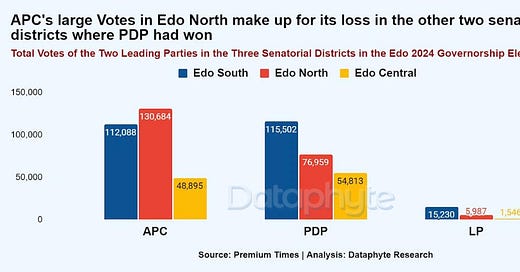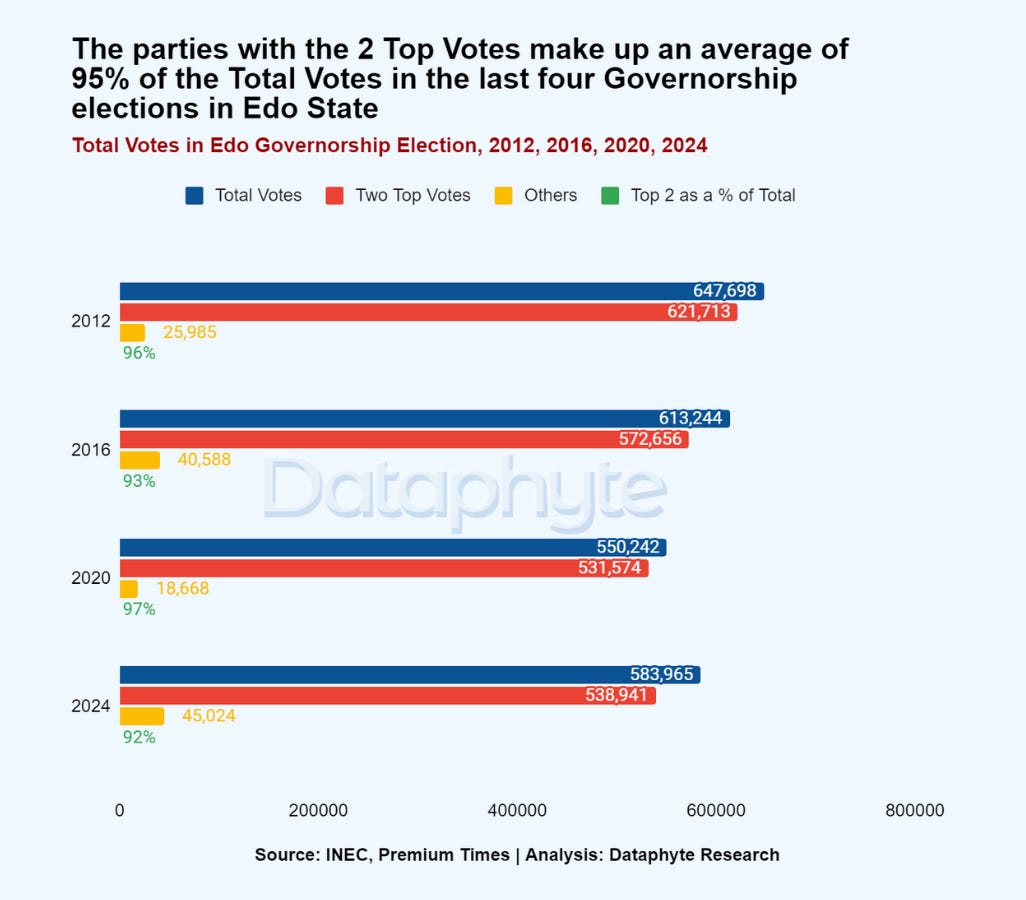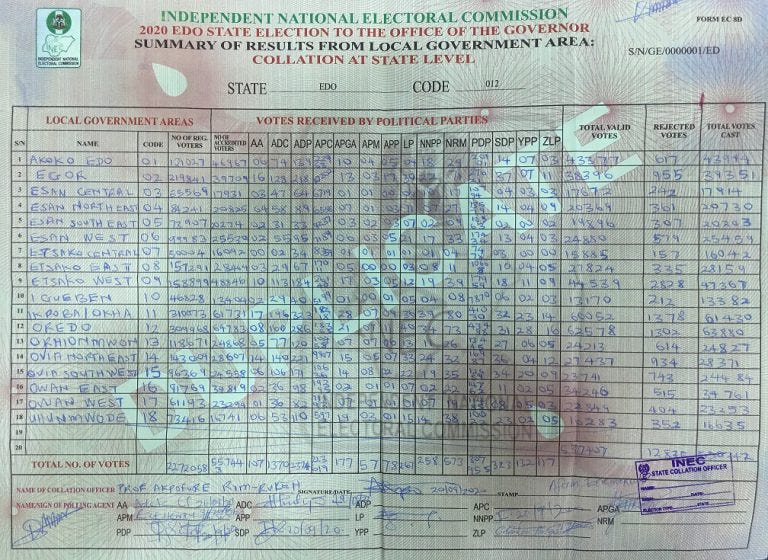Edo 2024: Of Liars and Outliers
Accusations have trailed the conduct of the Edo state Governorship elections from different quarters.
Besides the winning opposition party, the All Progressive Congress (APC), all other political parties, especially the incumbent Peoples Democratic Party (PDP), insist the September 21 election was a fraud.
The PDP allegedly preempted the electoral body and announced the election results before the Independent National Electoral Commission (INEC), insinuating that anything different that comes after the PDP’s count is a farce.
Besides the PDP, some observers like Yiaga Africa classified the election results at best as fractured facts.
A report by Yiaga Africa states “The incidents of results manipulation and disruptions during ward and local government collation in Ikpoba/Okha, Etsako West, Egor, and Oredo LGAs, including intimidation of INEC officials, observers, and party agents and the collation of results contrary to the provisions of the Electoral Act and INEC guidelines, severely undermine the credibility of the election results.
“Yiaga Africa strongly condemns the actions of some biased INEC officials who altered figures during collation including the actions of some security officials who interfered with the collation process.”
The candidate of the Labour Party, Olumide Akpata, who came a distant third, also insisted the conduct of the election was deeply flawed.
In short, every party except the APC believes INEC announced a lie.
But the APC too feels the PDP announcement of results was something between a misdemeanour and a desperate attempt at statistical fiction.
As things stand, it appears there are good liars on both sides.
Beyond Partisan Lies: Election Facts 2012 - 2024
Every election in Edo state since 2012, and indeed Nigeria, has been contested as rigged. Political parties in Nigeria, PDP, APC, ACN, APP, LP, and the rest, agree that INEC results are true only when they win.
This resembles a new phenomenon developing with a new political movement in the US, where a candidate defines a free and fair election as the one in which he wins - ‘the elections are rigged except it favours me syndrome.’
However, when partisan counts are kept out of the voting conversation, the facts begin to emerge.
First, the collective electoral indices in Edo State are on the decline.
While the increasing number of people turning 18 years old feeds the voter register with more numbers every four years, those who vote among them are decreasing in number and proportion in each election cycle.
This pattern of low voter turnout could be due to a lack of trust in the electoral system, security concerns, the perception that individual votes are inconsequential, and the disillusion of economic hardship.
Secondly, the Edo elections have remained a two-horse race since the 2012 elections. The other parties besides the two with the top votes only contribute an average of 5% to the total votes.
Then, just as the total votes are on the decline, so are the combined votes that the two contending parties share.
Beyond lies, INEC's inchoate election procedures may contribute to the people’s lack of confidence in the elections the body conducts.
The Independent National Electoral Commission (INEC), as the country's top electoral body, is responsible for publishing and preserving all election records, including results. But the commission appears to have yielded that responsibility to anyone who cares.
For instance, INEC published only the 2020 Edo governorship results on the “Election Results” page of its website. Such detailed results of the other Edo elections held in 2012, 2016, and 2024 are still not publicly available on INEC's website as of the time of writing this piece.
For 2016, the Commission published only the “declaration of results” without the “summary of results from local government areas” as in 2020.
This leaves the people prone to misinformation by an unsuspecting public.
And indeed various media outlets have reported these results with varying claims.
These variations in result records by the media may be unavoidable because many correspondents have to copy from long-hand records by INEC officials. The handwriting of the officials has been seen to confuse reporters who mistake 3 for 5, 9 for 7, and so on (see the vote recorded for APC in Akoko Edo in the 2020 Summary of Results from Local Government Area form).
Long-hand entries of figures may be difficult to read. To improve transparency and efficiency, manual entry should be minimised, and vote counts should be input directly into a machine-readable format. This makes it easy to copy the exact numbers the INEC officials meant to communicate.
The media has done its best.
To moderate differences in what reporters read and record, INEC should have all the details of the results on its website. Twelve years should be long enough for the commission to post the 2012 Election Results on its website.
Behind Edo South Outliers: Errors or Chance in 2024 Elections
Tracing voting patterns in former Edo Governorship elections till the 2024 election may help place its 2024 Poll results between a lie and an outlier. Either view has its implications.
Anyone following the Edo off-cycle elections since 2012 would have noticed a growing decline in the total number of votes available for the two top contending parties to share across all the local governments.
However, the seven local governments of Edo South Senatorial District experienced a disproportionate decline in their proportion of voters.
Local Governments in Edo North and Edo Central Districts saw increases in their top two party combined votes and none had up to a decline of 3,000 votes.
For Edo South LGAs, the least decline is 3,726 votes and the highest is 22,961 votes.
Between 2016 and 2012, the votes cast for the two top contenders decreased by 49,057. Their combined votes in 2020 were also less than in 2012 by 90,139. Compared with 2012, their combined votes in 2024 were less by 82,772.
However, the combined votes in the seven local governments in Edo South Senatorial district reduced disproportionately than others in the 2024 Elections.
In 2016, Edo South’s seven LGAs recorded a decline of 30,194 votes, 59% of the total decline of 49,057 in combined top two party votes.
Their votes decreased further by 63% as of 2020, 61,482 out of the total decline of 90,139 votes.
By the 2024 elections, 78,506, or 95% of the 82,772 decline in votes in Edo State was in Edo South.
This appears strange. It’s either the electorate in Edo South LGAs have lost interest in voting, and the disinterest growing from one election cycle to another.
If that is not the case, then it may be that their large voting numbers as of 2012 were not altogether correct.
The second proof that the decline in Edo South's vote is an outlier in 2024 is that Edo State’s median average decline is way below (less than half) of its mean average.
The mean voter decline in 2016 was 2,725, a 21% difference from its median decline of 2,154 for the state.
In 2020, the mean voter decline of 5,008 and the median voter decline of 5,053 had just a one percent difference.
However, in 2024, the mean decline of 4,598 voters in Edo State is 56% higher than its median decline.
The very high mean value in Edo State’s voter decline in the 2024 election, relative to the median value, suggests the presence of outlier(s).
It’s so easy to see where the outlier LGAs are - Edo South.
What is the implication of an outlier in a data set?
“An outlier is any value that is numerically distant from most of the other data points in a set of data. Measurement error, experiment error, and chance are common sources of outliers.”
Does it mean that the Edo State 2024 election results suffer from counting errors or it happened that voters in the most “populous” senatorial district went to sleep by chance on election day?











